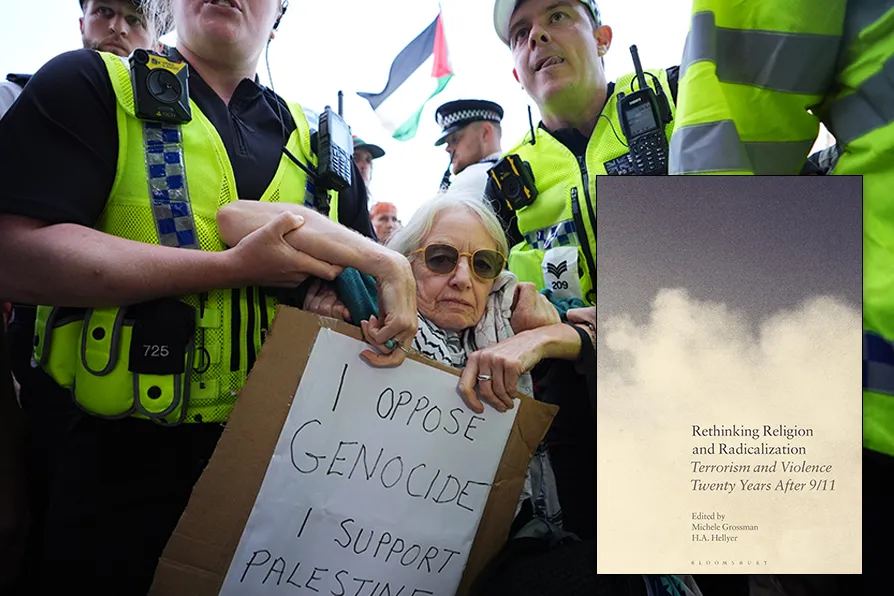GORDON PARSONS applauds a marvellous story of human ingenuity and youthful determination, well served by a large and talented company
ALEX HALL is frustrated by a book that ducks a clear definition of terrorism and fails to perceive the role of the state in sponsoring it

 FALSE ACCUSATION: Police officers detain a protester as demonstrators take part in a Lift the Ban on Palestine Action protest organised by Defend our Juries in Parliament Square in London, September 6, 2025
FALSE ACCUSATION: Police officers detain a protester as demonstrators take part in a Lift the Ban on Palestine Action protest organised by Defend our Juries in Parliament Square in London, September 6, 2025
Rethinking Religion and Radicalization: Terrorism and Violence Twenty Years after 9/11.
Edited by Michelle Grossman and HA Hellyer,
Bloomsbury, £21.99
IF published in 2022, this book would have been a thorough “tour d’horizon” of radicalisation studies. The essays, from a broad range of international academics, cover well-worn paths like Islamism alongside newer phenomena such as Covid conspiracies and the Orthobro movement.
However, in 2025, when the major world event is an expression of extremism so profound it is taking the form of a live-streamed genocide, much of the essays appear to be missing an elephant in front of them. Indeed, while some elements of zionist and Jewish supremacy are the topics of some contributions, the genocide in Gaza is not mentioned. A chapter on this subject would have immensely strengthened the work, given the abundance of material.
Some essays are clearly influenced by government funded programmes such as Prevent, where the civil servant commissions the academic to answer the policy question: why are Muslims prone to take violent action? What is it about the religion and how can we programme to mitigate it? What states do, in other words, is unimportant. How individuals organise within and inflict violence against states, and how to mitigate it, is of interest.
What the work as a whole misses is a clear definition of terrorism, for a focus on the beliefs of smaller, violent groups. In some works terror is primarily a tactic, and in others one which is predominately targeted against a civilian population in order to advance a particular cause. In the more discerning literature, states themselves don’t do terrorism, that’s just “non-state actors.” And these assumptions are held throughout this book.
In reality states are among the biggest exponents of terror. As tactics, September 11 2001 and many acts in WWII fit under the same rubric. The United States has been intimately involved in funding terrorism for decades, if not longer, whether in Latin America or across the Middle East to Afghanistan. The fingerprints of the US are all over the Maidan coup in Ukraine, the Nord Stream bombing, and it openly assists extremist regimes from Nicaragua to Israel.
According to much state theory, states are sovereign and have a monopoly on the (legitimate) use of force. When states do it it is “legitimate”, but when non-state actors do it, it’s a crime. The deviant is clearly identified as someone who has, either alone or with others, decided to use violence to further their particular beliefs. The problem is that this description can apply to the individuals in control of a state as much as it can to the identified deviants in need of study and intervention.
To solve the problem of violence the first task would be to define and then quantify it. To find out who is doing the most, and for what reason, and the lens would change significantly to where the interventions should be focused. The fact that some acts of violence are responses to greater crimes should surely be elucidated.
There are some words of pushback within the volume. Existing government policy has not been helpful. This includes the racialisation of extremism and the reductive nature of looking into religion as an explanation. Indeed, the Prevent programme can be seen as an attempt to make minorities “try harder” rather than to address their specific grievances, which for some may include expulsion from their homelands.
As well as attention to recent developments this volume would have benefited from a Marxist analysis. Imperialism, exploitation, resources and land are at the root of many pressing disputes. Which classes do terrorism? Who or what is being fought or protected? When is violence the answer? For that, unfortunately, we have to look elsewhere.

MARJORIE MAYO welcomes challenging insights and thought-provoking criticisms of a number of widely accepted assumptions on the left

ALEX HALL is unsurprised by the evidence of systemic corruption in the US, and unsettled by the undertone of alarm











